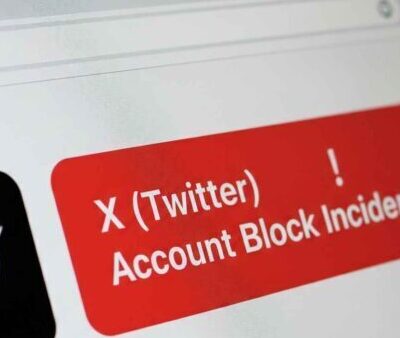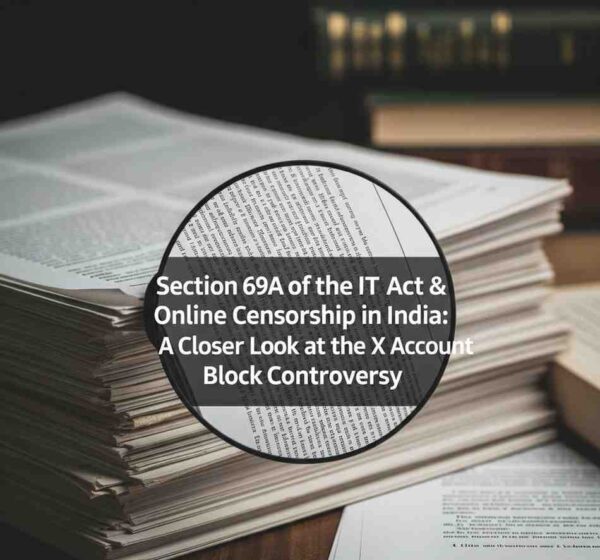Discuss Section 69A of the Indian IT Act and the controversy of the recent government order to block more than 2,000 X (ex-Twitter) accounts. Consider the legal, political, and social ramifications of freedom in cyberspace in India.
Introduction
In July 2025, a storm of controversy broke out when the Indian government, under Section 69A of the Information Technology (IT) Act, 2000, suspended more than 2,000 accounts on X (previously Twitter), including that of the international news organization Reuters. Although the accounts were restored after mass criticism, the incident once again brought into sharp focus the issue of online censorship, press freedom, and digital rights in India.
What is Section 69A of the IT Act?
Section 69A was enacted via the Information Technology (Amendment) Act, 2008. It authorizes the central government or its designated officers to order any agency or intermediary (such as a social networking site) to block public access to content on certain grounds:
- In the interest of sovereignty and the integrity of India
- For the defense of India, the security of a state
- To preserve friendly relations with foreign states
- In the interests of public order, or to avoid incitement to the commission of any cognizable offense
Significantly, such directives have to follow procedures and safeguards specified in the Information Technology (Procedure and Safeguards for Blocking Access of Information by Public) Rules, 2009.
The July 2025 X (Twitter) Account Block Incident

In a now globally reported action, the Indian Ministry of Electronics and Information Technology (MeitY) directed access blocking to at least 2,000 X accounts regarding Section 69A violations. Among those blocked were news outlets such as Reuters, activists, and journalists.
Why? Such accounts had duplicate material deemed misleading, inflammatory, or dangerous to public peace, though the government did not provide a public rationale for each instance, citing national security reasons.
The move instigated a swift backlash:
- Civil liberties organizations called the action arbitrary and transparent
- X Corp raised a formal protest but was compelled to conform to avert legal action under Indian law
- Social media public outrage compelled the government to reconsider and eventually roll back most of the block orders
The incident served as a reminder of the intensifying conflict between state control and online freedom in India’s digital space.
Legal Framework and Due Process Issues
Section 69A has constitutional validity—affirmed in the landmark judgment in Shreya Singhal v. Union of India (2015)—but the Supreme Court stressed that blocking orders should be rational, proportional, and follow due process.
Opponents allege the July 2025 action contravened the following principles:
- Shortcoming in transparency: The victims of blocking were not informed about the blocking order or provided an opportunity to react.
- No public record: There was no release of the blocking list or rationales, and it was impossible to determine whether the action was legal or not.
- Chilling effect on journalism: Blocking foreign media such as Reuters was criticized as threatening press freedom in a democratic environment.
The Role of Intermediaries such as X (Twitter)
According to India’s Intermediary Guidelines Rules, 2021, platforms such as X are obligated to adhere to directions from the government within tight timeframes. Non-compliance can result in loss of immunity under the law and even criminal liability.
But this puts platforms in a dilemma: Uphold users’ rights or comply with state instructions? X reinstated the blocked accounts only after high media and diplomatic pressure. This shows the international implications of India’s content regulation legislation, particularly for foreign media and technology companies.
Reactions from Media and Civil Society
Some prominent reactions were:
- Editors Guild of India denounced the action as “an attack on media freedom.”
- Internet Freedom Foundation (IFF) urged a court review of the implementation of Section 69A
- International media monitors appealed to India to change its digital censorship laws by global human rights practices
These reactions mirror increasing concern about the direction of India’s internet governance.
Why This Matters: The Bigger Picture
India is the world’s largest democracy and a major digital market, with more than 800 million internet users. Any legal provision to limit content has far-reaching implications:
- It affects press freedom, civic engagement, and digital entrepreneurship
- Untamed powers can result in authoritarian excess
- It creates an international precedent—other nations may do the same under similar legislation
Equilibrium between national security and civil liberties is essential. The government needs mechanisms to prevent misinformation and incitement, but robust checks, judicial review, and transparency must accompany these mechanisms.
Way Forward: Reforming Section 69A
Lawyers and civil society have put forth a range of suggestions:
- Publish blocking orders publicly, except where national security is truly at stake
- Provide affected parties with the ability to appeal and obtain redress
- Establish an independent review board to monitor blocking orders
- Implement legislative changes to curb abuse and align India with international best practices, such as the UN Guidelines on Free Expression
Conclusion
The July 2025 X account blocking episode is a potent reminder that digital freedom is an essential democratic principle. Section 69A, as a means of national security, is still required, but it has to be exercised wisely, transparently, and accountably.
As India continues to emerge as a digital-first economy and democracy, getting the balance right between security and free speech is not only a legal issue—it’s an ethical imperative

























